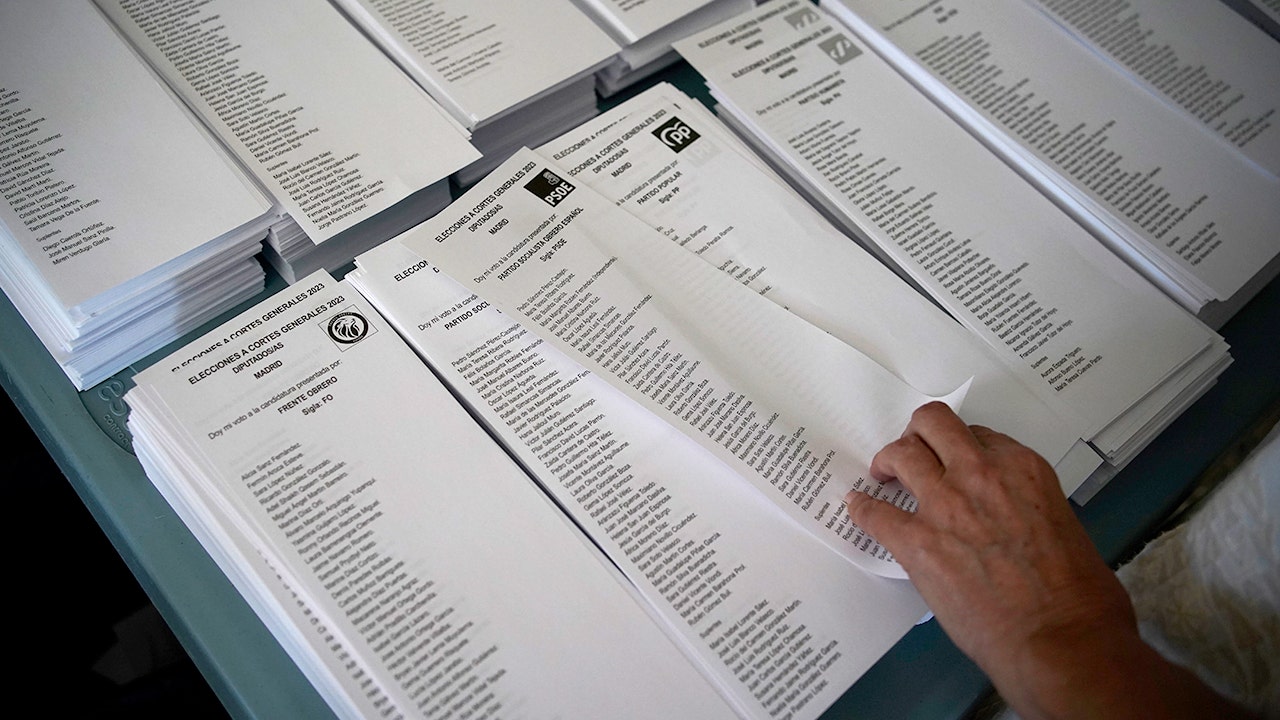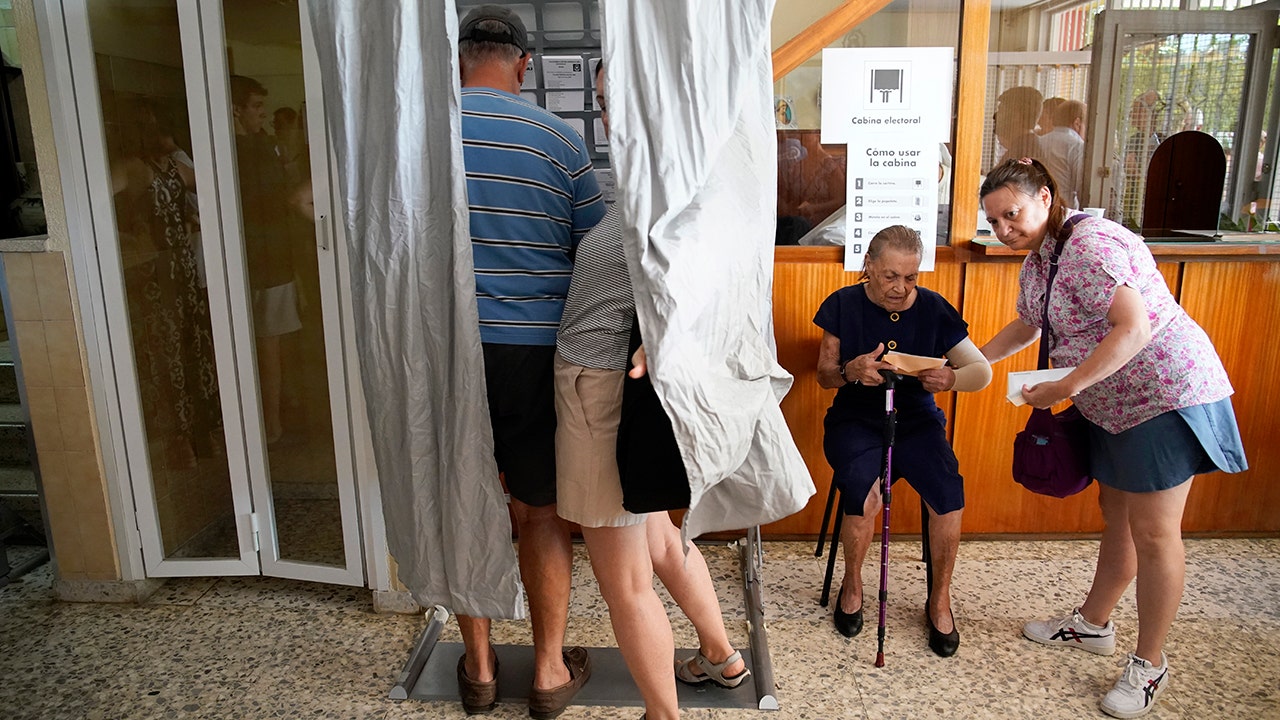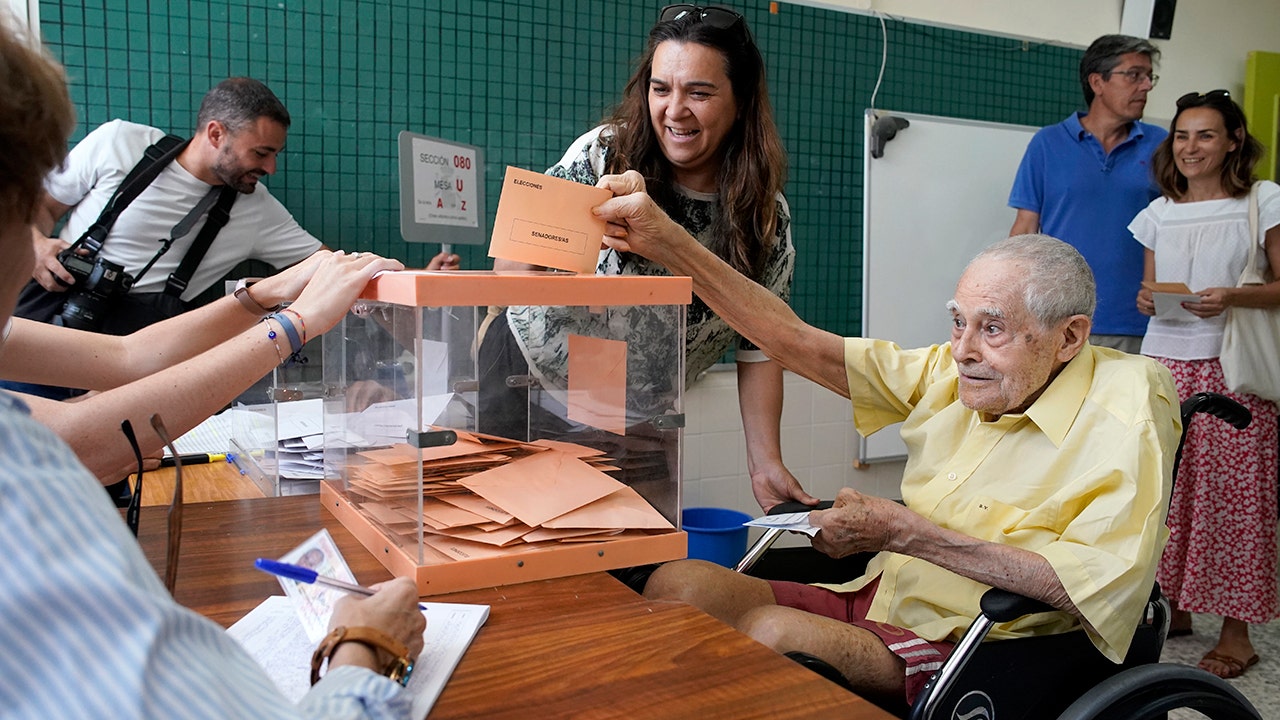Spain appeared headed for political gridlock after Sunday’s general election showed no clear front-runner to build a coalition government.
Though the conservative Popular Party won the election, it fell short of removing Prime Minister Pedro Sánchez, leader of the Spanish Socialists Workers Party.

A voter picks a ballot for the Socialist Party at a polling station for Spain’s general election, in Madrid, Sunday, July 23, 2023. (AP Photo/Andrea Comas)
The mainstream conservative Popular Party, which led most polling during the campaign, was hoping that its first national victory since 2016 could let candidate Alberto Núñez Feijóo unseat Sánchez. But it needed the help of far-right Vox to do so.
Even though Sánchez’s Socialists finished in second place, they and their allied parties celebrated the outcome as a victory since their combined forces gained slightly more seats than the PP and the far-right. The bloc that could likely support Sánchez totaled 172 seats; the right bloc behind Feijóo, 170.
A PP-Vox government would have pushed another EU member firmly to the right, following similar developments in Sweden, Finland and Italy.
GUATEMALAN AUTHORITIES RAID LEFTIST PRESIDENTIAL CANDIDATE’S PARTY OFFICES
Spain’s two main leftist parties are pro-EU participation. On the right, the PP is also in favor of the EU. Vox, headed by Santiago Abascal, is opposed to EU interference in Spain’s affairs.
The closer-than-expected election was likely to produce weeks of political jockeying and uncertainty over the country’s future leadership. The next prime minister only would be voted on once lawmakers are installed in the new Congress of Deputies.

A couple enter a voting booth for Spain’s general election at a polling station in Madrid, Sunday, July 23, 2023. (AP Photo/Andrea Comas)
But the chances of Sánchez of picking up the support of 176 lawmakers — the absolute majority in the Madrid-based Lower House of Parliament — needed to form a government are not great either. The divided results have made the hardline Catalan separatist party Junts (Together) emerge as Sánchez’s potential kingmaker. If Junts asks for a referendum on independence for northeast Catalonia, that would likely be far too costly a price for Sánchez to play.
Voters are to elect 350 members to the lower house of Parliament and 208 members to the Senate.
With 98% of votes counted, PP is on track for 136 seats. Even with the 33 seats that the far-right Vox is poised to get and the one seat going to an allied party, the PP would still be seven seats from the absolute majority.
ISRAEL EX-SECURITY CZAR BACKS RESERVIST PROTEST AGAINST NETANYAHU JUDICIAL REFORM PLAN
The Socialists are set to take 122 seats, two more than they had. But Sánchez can likely call on the 31 seats of its junior coalition partner Sumar (Joining Forces) and several smaller forces to at least total more than the sum of the right-wing parties.
Sumar, which brings together 15 small leftist parties, is led by second Deputy Prime Minister Yolanda Díaz, the only woman among the top four candidates.

A voter casts his ballot in Spain’s general election in Madrid, Sunday, July 23, 2023. (AP Photo/Andrea Comas)
With no party expected to garner an absolute majority, the choice is basically between another leftist coalition and a partnership of the right and the far right.
US AMBASSADOR ARGUES SANCTIONS ON MACEDONIAN BUSINESSMAN HELP COUNTRY’S EU BID
Sánchez’s government has steered Spain through the COVID-19 pandemic and dealt with an inflation-driven economic downturn made worse by Russia’s invasion of Ukraine.
But his dependency on fringe parties to keep his minority coalition afloat, including the separatist forces from Catalonia and the Basque Country, and his passing of a slew of liberal-minded laws may cost him his job.
CLICK HERE TO GET THE FOX NEWS APP
The right-wing parties vow to roll back dozens of Sánchez’s laws, many of which have benefited millions of citizens and thousands of companies.
Near-final results were expected before midnight.
The Associated Press contributed to this report.
(this story has not been edited by TSA Mag staff and is published from a syndicated feed.)
Spain appeared headed for political gridlock after Sunday’s general election showed no clear front-runner to build a coalition government.
Though the conservative Popular Party won the election, it fell short of removing Prime Minister Pedro Sánchez, leader of the Spanish Socialists Workers Party.

A voter picks a ballot for the Socialist Party at a polling station for Spain’s general election, in Madrid, Sunday, July 23, 2023. (AP Photo/Andrea Comas)
The mainstream conservative Popular Party, which led most polling during the campaign, was hoping that its first national victory since 2016 could let candidate Alberto Núñez Feijóo unseat Sánchez. But it needed the help of far-right Vox to do so.
Even though Sánchez’s Socialists finished in second place, they and their allied parties celebrated the outcome as a victory since their combined forces gained slightly more seats than the PP and the far-right. The bloc that could likely support Sánchez totaled 172 seats; the right bloc behind Feijóo, 170.
A PP-Vox government would have pushed another EU member firmly to the right, following similar developments in Sweden, Finland and Italy.
GUATEMALAN AUTHORITIES RAID LEFTIST PRESIDENTIAL CANDIDATE’S PARTY OFFICES
Spain’s two main leftist parties are pro-EU participation. On the right, the PP is also in favor of the EU. Vox, headed by Santiago Abascal, is opposed to EU interference in Spain’s affairs.
The closer-than-expected election was likely to produce weeks of political jockeying and uncertainty over the country’s future leadership. The next prime minister only would be voted on once lawmakers are installed in the new Congress of Deputies.

A couple enter a voting booth for Spain’s general election at a polling station in Madrid, Sunday, July 23, 2023. (AP Photo/Andrea Comas)
But the chances of Sánchez of picking up the support of 176 lawmakers — the absolute majority in the Madrid-based Lower House of Parliament — needed to form a government are not great either. The divided results have made the hardline Catalan separatist party Junts (Together) emerge as Sánchez’s potential kingmaker. If Junts asks for a referendum on independence for northeast Catalonia, that would likely be far too costly a price for Sánchez to play.
Voters are to elect 350 members to the lower house of Parliament and 208 members to the Senate.
With 98% of votes counted, PP is on track for 136 seats. Even with the 33 seats that the far-right Vox is poised to get and the one seat going to an allied party, the PP would still be seven seats from the absolute majority.
ISRAEL EX-SECURITY CZAR BACKS RESERVIST PROTEST AGAINST NETANYAHU JUDICIAL REFORM PLAN
The Socialists are set to take 122 seats, two more than they had. But Sánchez can likely call on the 31 seats of its junior coalition partner Sumar (Joining Forces) and several smaller forces to at least total more than the sum of the right-wing parties.
Sumar, which brings together 15 small leftist parties, is led by second Deputy Prime Minister Yolanda Díaz, the only woman among the top four candidates.

A voter casts his ballot in Spain’s general election in Madrid, Sunday, July 23, 2023. (AP Photo/Andrea Comas)
With no party expected to garner an absolute majority, the choice is basically between another leftist coalition and a partnership of the right and the far right.
US AMBASSADOR ARGUES SANCTIONS ON MACEDONIAN BUSINESSMAN HELP COUNTRY’S EU BID
Sánchez’s government has steered Spain through the COVID-19 pandemic and dealt with an inflation-driven economic downturn made worse by Russia’s invasion of Ukraine.
But his dependency on fringe parties to keep his minority coalition afloat, including the separatist forces from Catalonia and the Basque Country, and his passing of a slew of liberal-minded laws may cost him his job.
CLICK HERE TO GET THE FOX NEWS APP
The right-wing parties vow to roll back dozens of Sánchez’s laws, many of which have benefited millions of citizens and thousands of companies.
Near-final results were expected before midnight.
The Associated Press contributed to this report.
















